Funky Kung Fu: An Interview with Chris DeAngelis
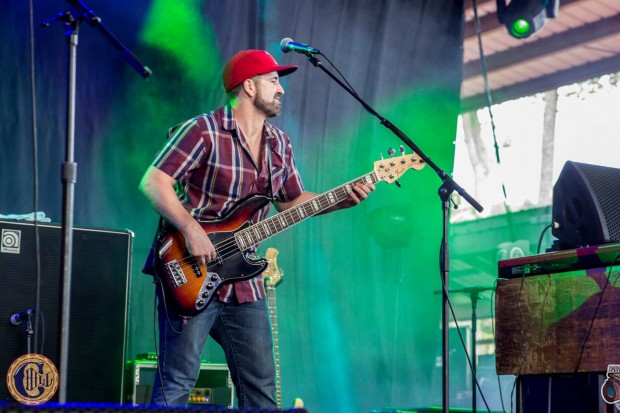
As music progresses, genres have been blurring into wonderful collages of inspiration. One band that helps prove that point is Kung Fu, a band describes their songs as a “70’s funk-fusion meets modern dance party.” That party is anchored by monster bassist Chris DeAngelis.
DeAngelis simultaneously draws from jazz, funk, hip-hop, and rock to create hypnotic bass lines. As a longtime Phish fan, he’s also well versed in fitting those styles into different jam situations to fluently follow his bandmates in sonic exploration.
When he isn’t on the road with Kung Fu, the bassist also plays with The Breakfast and makes his own music. His YouTube channel is full of tasteful solo bass covers, while his side project LoEndFreque delves into electronic music.
We caught up with DeAngelis to get his musical origin story, some tips on jamming, a lesson on his composition “Snaggle”, and the scoop on Kung Fu’s upcoming album.
How did you get into music?
I first picked up a bass in middle school. I was playing guitar a little bit before that, but once I got to middle school it was the kind of deal where they didn’t have guitar in the school band. My friends wanted to play bass, so I said, “OK, I’ll play bass.” It was funny because the other two kids wouldn’t play the music – they’d fake play. I’d be the only one playing, so there would be three kids on stage and one bass actually playing.
My middle school band director was [Ozzy Osbourne guitarist] Randy Rhodes’s father. I remember seeing the Guitar Player magazine with Randy mounted on the wall, but I was really young and didn’t understand the significance of it. He was a really good, encouraging kind of dude. He had to shush me a lot because I’d be playing Guns N’ Roses riffs while he was talking to different sections of the band.
When I got into high school, I didn’t really play. I was into sports, so music was on the backburner. Then I started going to see some concerts. I saw Phish and Weezer and some other groups. I don’t know what the moment was, but I realized I had to pick it up again. I saw the crowd of people and the whole thing going on and I said, “I want to do this.” So I went home and bought a Lotus P-bass knockoff from a pawn shop. I played in a band doing rock stuff.
There weren’t a lot of people around me to play music with, so I ended up going to college for music in Danbury, Connecticut at West Connecticut University. I wanted to be around more musicians and get into a scene. Where I was living at the time, I didn’t have any money so I got a couple college loans and went off. Everybody I’ve played with since then has been a direct connection through that school for me.
My first bass teacher during my first lesson said, “Play something.” So I played an E funk thing. He started playing the upright in the thumb position and took a solo. I didn’t even know that was possible. A year later I had a cheap plywood upright and I’ve been playing upright ever since. I’m heavy into it, too. I’ve been playing jazz and rock. My influences are jazz and rock melded together with funk, obviously.
I immersed myself in jazz because it was part of the school program, but I fell in love with it. My extent of jazz at the time was Medeski, Martin, and Wood, and some fusion stuff. Then I got way into acoustic jazz and immersed myself for four or five years in playing acoustic jazz, playing gigs wherever. One gig led to the next which led to the next. I was never got the whole “don’t listen to rock if you’re a jazz musician,” or vice versa. Some people get stuck in that mindset and I think, “Wow, how can you deny anything that’s really good?” I’m still getting into jazz harmony. For me, that’s a life long process. But that led me to fusion and funk and trying all sorts of stuff.
Then I met some of the other guys that play in Kung Fu through a band called The Breakfast, which is a Connecticut-based band. The guitar player and the drummer play in that band, too. I was playing gigs with the keyboard player of The Breakfast at the time, doing jazz gigs and pickup gigs. I was getting around and getting gigs. Not making a lot of money though. [laughs]
I met The Breakfast guys and they had a band that had national recognition. At first it didn’t really make any money. I toured with that band extensively for about two years, then that led to the creation of Kung Fu.
Kung Fu has two or three members that are in The Breakfast, right?
Yeah, the guitar player, the drummer and myself are in both bands. That band is formerly known as Psychedelic Breakfast. They play a little bit different music, more like rock-heavy jam side, where Kung Fu is more fusion-funk but still with elements of rock. I don’t know what you call it anymore. [laughs]
That’s the thing: there are so many labels for music now. Do you take offense to the jam band label or do you embrace it?
It can be a blessing and a curse. Even being called a fusion band can be taken either way. Like I said, some jazz musicians will frown on that kind of stuff. I’m sure there’s a lot of fusion that’s just not good. When I think of fusion, I think of Return to Forever and Weather Report. That’s the stuff that if we’re going to draw from, it’s going to be that. I’m a huge Jaco Pastorius fan. He does that to every bass player.
One of my first bass teachers showed me “Birdland.” When I realized he was doing the harmonics, I thought “That’s the bass?” Everybody does that the first time you hear him. It’s hard to fathom at first when you hear him. I got really heavy into his compositions. The new Jaco documentary gives really great insight into him. He was such a genius. I went through the whole phase of learning “Portrait of Tracy” and the solo from “Havona.”
Listening to your style, my sense was that it was like Rocco [Prestia] meets Jaco. Did you go through a Tower of Power phase, too?
Oh, I love Rocco. Thank you, that’s a huge compliment. He’s definitely another one. What I got from him was more of the ghost note approach, playing constant sixteenth notes. Rocco and Anthony Jackson, too. The muted stuff is almost as big a part as the played notes. If you’re going to learn a bass line, you need to know the muted parts, too.
How do you work on incorporating their styles into your own playing?
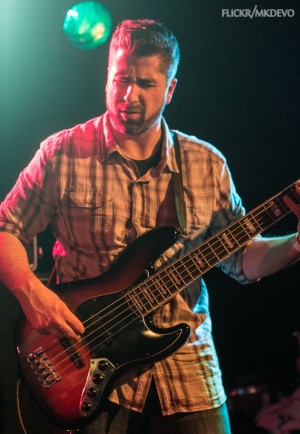 I think probably the same as most musicians: I’ve transcribed a lot of stuff, mostly non-bass players I would say, for soloing. When it comes time to solo, I don’t want to sound like a bass player, I want to sound like a horn player or a guitar player. I transcribed a lot of [trumpeter] Clifford Brown, and a lot of other trumpet players, actually. Trumpet always seems to resonate with me. Just the cleanness of the notes. I can hear each note clearly, whereas with a guy like Coltrane there’s more stuff going on to begin with. It’s tough to recreate and articulate like that on the bass.
I think probably the same as most musicians: I’ve transcribed a lot of stuff, mostly non-bass players I would say, for soloing. When it comes time to solo, I don’t want to sound like a bass player, I want to sound like a horn player or a guitar player. I transcribed a lot of [trumpeter] Clifford Brown, and a lot of other trumpet players, actually. Trumpet always seems to resonate with me. Just the cleanness of the notes. I can hear each note clearly, whereas with a guy like Coltrane there’s more stuff going on to begin with. It’s tough to recreate and articulate like that on the bass.
There are a few licks that I’ve converted into my own. You just have to learn how to play any harmonic sound and apply it to whatever situation you’re in or whatever chord you’re playing on. If it’s a one chord jam or if it’s something with changes, you need to know where to inject this thing. It becomes like a color or a tool in your toolbox. It’s something you can pull from whenever. Over years of playing and doing different styles, you just have to pick it up.
Kung Fu is a demanding band in that way. We definitely improvise and do a different set list every night. It’s very demanding music to play to begin with. Certain songs stretch out a solo section. Sometimes there’s two soloists and they bring the song to these crazy heights, then all of the sudden it’s “Here you go!” to pass it off to me. I’m not a huge slapper, like [Consider the Source’s] John Ferrara. He gets a lot of excitement out of the instrument with his slapping, so I have to figure out how to do that with fingerstyle.
The goal is to balance what you think is hip and what you know people will like. If you’re jazz influenced, it’s attempting to translate that type of music to not just other jazz musicians. [You want to] be able to translate what you’re playing to a larger audience of people. People just like good music. They probably don’t know anything about jazz and harmony and all this stuff, but it’s a useful tool. I wouldn’t be where I am without it.
Learn “Snaggle” from Tsar Bomba (PDF download)
How do you tackle those one chord jams?
From a bass standpoint, it’s all about feel and repetition. You have to have a James Brown mentality. It just depends on who you’re playing with. My drummer can hit it hard, but he also goes for stuff. He’ll go with the soloist instead of playing strictly to the bass. There are some drummers who stick with the groove side of it, and there are some drummers who go for that Vinnie Colaiuta or Dennis Chambers kind of vibe. He’s just like a sponge. So I have to find my place. It’s developed to where when I hear him doing that kind of stuff, I’ll lay back and just push the groove.
[A good approach is] layering ideas over four or eight bars. You have to find an idea and develop that then keep building, or you can just keep the same thing going the whole time with little nuances. That sometimes can be more effective than playing a lot of notes. I’ve been trying to pick and choose my spots in the groove to get the most out of what I’m playing.
When it comes to soloing, you can step out of that one chord kind of zone and start superimposing progressions overtop. If it’s a one-chord G minor jam, I’m thinking pretty much everything but G minor, a lot of times. I’m trying to get to G minor in a soloing kind of sense. On the downbeat, I want to hit the fifth of the chord and do a A half-diminished/D7 lick to get to that G. Or just do a D Altered sound or a half-whole diminished sound. It’s about creating tension.
A lot of it depends on if you have the chordal support or if the whole band cuts out and it’s just you and the drums. What’s going to get the most milage? It’s like Victor Wooten’s quote: The first thing that most bass players do wrong is that when it comes to soloing, they stop grooving. If you see people stop dancing, then you’re not doing your job. I agree with that to an extent I guess, but you have to feed off the crowd’s energy, too. What I would play over a chord alone in my house would be totally different if I was playing it in front of a crowd of people. Sometimes a bass line solo can be cooler than anything else. Pino Palladino all day. I’m just trying to draw from as many good things as I can.
Are you a gear head?
Yeah, I’ve been getting more into it. I use a lot of pedals for videos on my YouTube channel, where I’ve been building up a repertoire of solo bass things.
It’s cool to see the range of your YouTube videos, because I can tell you’re still inspired by the music.
It’s something I’ve always done. I’ve always had a bass with a high C string and I like to figure out cool arrangements. Hearing guys like Thundercat and what they’re doing, it’s inspiring. He really leads the band with his style. Since then I’ve played a couple solo bass gigs, which was interesting. That’s a totally new thing for me, but I’m trying to challenge myself. I like to see if I can get through a whole gig by myself. It’s a lot of work, but I love doing it.
 <
< <
< <
<What’s going on with Kung Fu besides touring?
Kung Fu has been in the studio working on some new music. We’re working towards an early 2016 release date for our new album, and we’ve got pretty much 80% done. We’re going back into the studio at the end of December to finish it up and get everything pressed.
We’ve got a lot of new tunes, and we finally got around to recording some stuff that we’ve been playing for a little while. It’ll be good to get those out. We’re working with Tim Walsh, who mixed Tsar Bomba. He’s also a drummer in the band called Stepkids. He’s a really gifted engineer and we work together really well.
Is the new album a lot different than Tsar Bomba, or do you see it as an evolution?
I would say it’s definitely different, but the core of it still retains what we are. The hard-hitting fast stuff is there, but we go in some new directions, too. We have a bunch more vocals on this album. We wrote a couple new songs in the last few months, one of which I wrote, and one that the guitarist and saxophonist wrote called “Daddy D.” It’s about R.A. Dickey, the pitcher for the Blue Jays. It’s about throwing knuckleballs, and it’s got a real Minnesota, “Prince” kind of sound. [R.A. Dickey] really liked it. We were trying to get him to use it for his walk out music, but maybe if he used it he would have lost! [laughs] But he actually reached out and said how much he liked it.
I sing lead vocals on the song I wrote. I’ve been getting into singing over the last few years, just pushing myself as I said before. I like doing gigs where I’m totally uncomfortable. Kung Fu covered the Steely Dan album The Royal Scam last winter and we had John Herington and Bernard Purdie play with us. We all passed around the vocal chair. It worked out. [Steely Dan’s] Dan Fagen didn’t have the strongest voice, but the melodies and the harmonies are so strong that it worked.
Some songs are easier to sing and some can be so difficult. We also do “Cult of Personality,” and I sing that and play that. That’s the kind of song that you have to slow down so much that you say, “Ok, this word happens right after this note.” You’re learning how to do the two things at once and it becomes second nature eventually. Not many people can sing and play complex bass lines, but it’s a good challenge. You definitely learn a lot from it.
That’s the important part, isn’t it?
Definitely. You can’t get too afraid or too complacent, you know what I mean? That’s my fear. I’ve always said that no matter what I do I want to stay curious. I want to be grateful that there’s other great music in the world. We live in an age where there is so much music to wrap your head around, and some people still get stuck in their ways. It can be taxing on your brain to learn things over and over and over again, but I think it’s more harmful to not do that. You forget that practicing is important, and then five years go by and you haven’t really progressed. I just want to get better. That’s what I’ve always wanted to do.

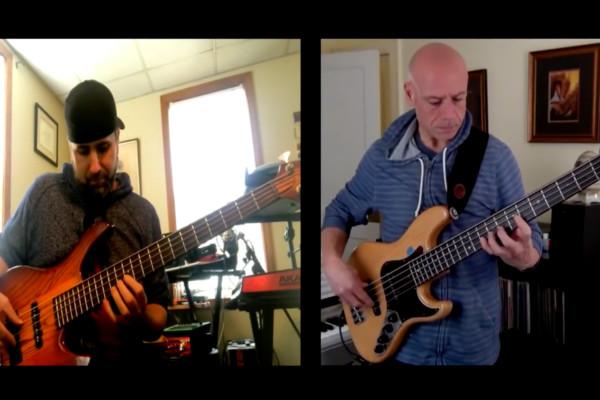
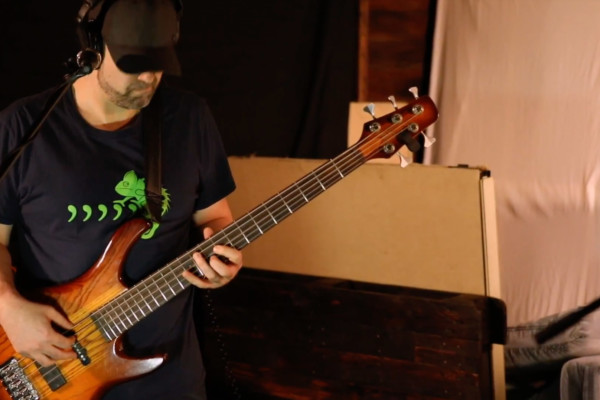
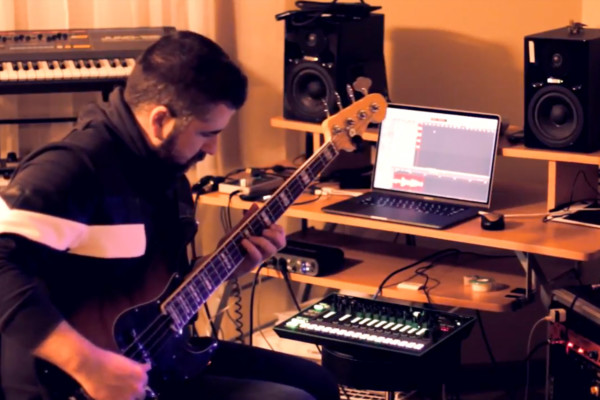
Chris this was nice , thanks for your video , I didn’t think much of Jazz till Marcus Miller and it changed my way of listening , got away from Hard Rock to Jazz , got to keep a variety of music open in mind , not just playing it but feeling it.